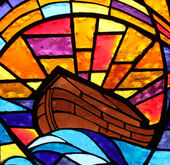
In these turbulent days of Mideast news – the shock, the spiral of despair and death, the worry that worse may yet be to come – it all can feel overwhelming, as if the torrent is all but sure to destroy the innocent along with the rest.
Facing his own torrent of overwhelm and destruction, Noah built an ark – with a skylight. Yes, a skylight open to the torrent.
So must we.
Facing his own torrent of overwhelm and destruction, Noah built an ark – with a skylight. Yes, a skylight open to the torrent.
So must we.

By Rabbi David Evan Markus
Noah 5784 (2023)
Note: These words come during the 2023 Israel-Hamas War, sparked by a terror attack on Israeli innocents that became the world's most lethal day for Jews since the Holocaust. Because current judicial ethics rules ban me from discussing the Israeli-Palestinian conflict, I focus instead on some of the emotional and spiritual implications for us and our Judaism.
We know the Biblical story of Noah – the ark, the animals, the 40 days of flooding rain from above, the geysers flooding from below, the months adrift, the raven, the dove, the olive branch, the promise, the rainbow. Numerous civilizations share similar narratives about an epic flood washing away prehistory and rebooting humanity.
Whatever our politics or beliefs about the Mideast situation, we all can hope – and pray, and insist – that from the ongoing flood of blood will come a life-affirming reboot. Meanwhile, how to navigate the torrent while rocked by gut-churning images, fear, anger or despair?
Note: Israeli psychologists urge people to limit news and social media consumption at this time. Staying glued to the news may feel loyal, and like we're combating helplessness by doing something, but psychologists insist that actually we're not "doing" anything helpful by marinating in it. To the contrary, overwhelm from over-consuming violent news gives terror a collateral win and ultimately propagates harm. Psychologists suggest consuming news only once or twice daily, reading rather than watching or listening, and making a practice of tangible helpful steps in community like volunteerism, connection and charity.
How did Noah navigate the torrent that overwhelmed the world? For his part, Noah built an ark and covered it with pitch – in Hebrew, כופר / kofer (the same root as Yom Kippur, named for the teshuvah and purification by which we and the One we call God no longer see our missed marks, which then are as "covered over").
Pitch kept Noah's ark waterproof to survive the tempest – but there was one spot on the Ark that couldn't be covered in pitch: a skylight (Gen. 6:16):
Noah 5784 (2023)
Note: These words come during the 2023 Israel-Hamas War, sparked by a terror attack on Israeli innocents that became the world's most lethal day for Jews since the Holocaust. Because current judicial ethics rules ban me from discussing the Israeli-Palestinian conflict, I focus instead on some of the emotional and spiritual implications for us and our Judaism.
We know the Biblical story of Noah – the ark, the animals, the 40 days of flooding rain from above, the geysers flooding from below, the months adrift, the raven, the dove, the olive branch, the promise, the rainbow. Numerous civilizations share similar narratives about an epic flood washing away prehistory and rebooting humanity.
Whatever our politics or beliefs about the Mideast situation, we all can hope – and pray, and insist – that from the ongoing flood of blood will come a life-affirming reboot. Meanwhile, how to navigate the torrent while rocked by gut-churning images, fear, anger or despair?
Note: Israeli psychologists urge people to limit news and social media consumption at this time. Staying glued to the news may feel loyal, and like we're combating helplessness by doing something, but psychologists insist that actually we're not "doing" anything helpful by marinating in it. To the contrary, overwhelm from over-consuming violent news gives terror a collateral win and ultimately propagates harm. Psychologists suggest consuming news only once or twice daily, reading rather than watching or listening, and making a practice of tangible helpful steps in community like volunteerism, connection and charity.
How did Noah navigate the torrent that overwhelmed the world? For his part, Noah built an ark and covered it with pitch – in Hebrew, כופר / kofer (the same root as Yom Kippur, named for the teshuvah and purification by which we and the One we call God no longer see our missed marks, which then are as "covered over").
Pitch kept Noah's ark waterproof to survive the tempest – but there was one spot on the Ark that couldn't be covered in pitch: a skylight (Gen. 6:16):
| צֹהַר תַּעֲשֶׂה לַתֵּבָה וְאֶל-אַמָּה תְּכַלֶּנָּה מִלְמַעְלָה וּפֶתַח הַתֵּבָה בְּצִדָּהּ תָּשִׂים | Make a skylight for the ark, finish [the ark] a cubit above it, and make a door for the ark on its side.... |
Imagine sitting in your car as it moves through a carwash, or last summer's extreme rainfall events. Now imagine sitting in your car during the torrent while a sunroof is open. Now call it the will of God that there be an open sunroof amidst the torrent.
Huh? Why? Why a skylight?
A facile answer is that without a skylight, it'd be totally dark inside the ark. But what light could a skylight cast during a 40-day torrent so dark that "floodgates of the sky" covered the earth? And how could an open skylight not flood the ark itself?
Midrash imagines that the skylight was a big precious jewel that reflected light throughout the ark, like a disco ball – a beautiful idea, but it doesn't quite answer our practical questions.
I can't offer architecturally and physically sound answers about the ark's skylight. I suspect nobody can – which might well be the point.
Huh? Why? Why a skylight?
A facile answer is that without a skylight, it'd be totally dark inside the ark. But what light could a skylight cast during a 40-day torrent so dark that "floodgates of the sky" covered the earth? And how could an open skylight not flood the ark itself?
Midrash imagines that the skylight was a big precious jewel that reflected light throughout the ark, like a disco ball – a beautiful idea, but it doesn't quite answer our practical questions.
I can't offer architecturally and physically sound answers about the ark's skylight. I suspect nobody can – which might well be the point.

Any answer will be trans-rational – not logical. It could be only by some kind of suspension of the laws of physics, or some other divine intervention, that a skylight open to the torrent wouldn't flood the ark and instead would light up the darkness.
Perhaps God didn't need a skylight to save Noah and his family, and to illuminate the ark during months adrift. After all, God is God. But even if God didn't need a skylight, Torah's point is that Noah did. Noah needed a skylight.
Only by Noah building the ark – and only by building an ark with a skylight – could Noah experience this quality of trans-rational power and miraculous salvation.
Put another way, we need to act "as if." Noah's skylight teaches us to show up and do all we can, in partnership with a Power beyond power and a Logic beyond logic – "as if" they exist and will assuredly meet us at the furthest extent of our capacity, logic, reason, resilience and very self. This "showing up" isn't passivity but the very opposite – a radically active quality of doing and being.
Despite even a killing flood, we too must build an upward facing skylight, as if light – inflow, life, divinity, spirituality, whatever our metaphor – will penetrate the darkness and somehow not let in the flood. We can protect our fragile hearts, minds and spirits against the torrent, but we must not hermetically seal ourselves in.
Or to use a favorite and barely veiled theological song line from the 1990 They Might Be Giants' album Flood, "make a little birdhouse in your soul" (lyrics, video).
It's hard not to steel ourselves against the news, and not go numb to it, and not turn away entirely, and not addict ourselves to its raging waters. We need protection, but too much protection will protect ourselves out of light – even at risk of getting soaked. Noah's skylight teaches us that, in fact, we won't get flooded by keeping our souls and hearts open during this time that otherwise might well trigger our instincts to close down inside.
It's a radical act of faith – but there's good reason for the story and great reason to heed its teaching. After all, somehow, we're promised a dove and a rainbow on the other side.
Perhaps God didn't need a skylight to save Noah and his family, and to illuminate the ark during months adrift. After all, God is God. But even if God didn't need a skylight, Torah's point is that Noah did. Noah needed a skylight.
Only by Noah building the ark – and only by building an ark with a skylight – could Noah experience this quality of trans-rational power and miraculous salvation.
Put another way, we need to act "as if." Noah's skylight teaches us to show up and do all we can, in partnership with a Power beyond power and a Logic beyond logic – "as if" they exist and will assuredly meet us at the furthest extent of our capacity, logic, reason, resilience and very self. This "showing up" isn't passivity but the very opposite – a radically active quality of doing and being.
Despite even a killing flood, we too must build an upward facing skylight, as if light – inflow, life, divinity, spirituality, whatever our metaphor – will penetrate the darkness and somehow not let in the flood. We can protect our fragile hearts, minds and spirits against the torrent, but we must not hermetically seal ourselves in.
Or to use a favorite and barely veiled theological song line from the 1990 They Might Be Giants' album Flood, "make a little birdhouse in your soul" (lyrics, video).
It's hard not to steel ourselves against the news, and not go numb to it, and not turn away entirely, and not addict ourselves to its raging waters. We need protection, but too much protection will protect ourselves out of light – even at risk of getting soaked. Noah's skylight teaches us that, in fact, we won't get flooded by keeping our souls and hearts open during this time that otherwise might well trigger our instincts to close down inside.
It's a radical act of faith – but there's good reason for the story and great reason to heed its teaching. After all, somehow, we're promised a dove and a rainbow on the other side.

 RSS Feed
RSS Feed